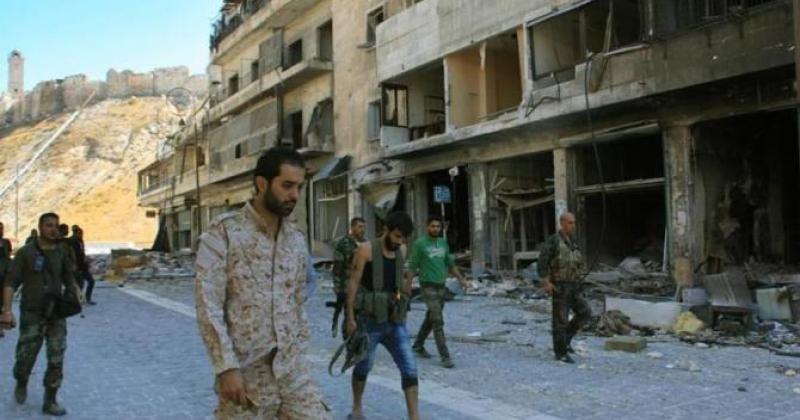But despite being bombed, schools are rebuilt and remain open: “We are responsible for pupils, no matter what”.
“Religious are like soldiers. And soldiers don’t run away.” Sister Luisa points to the tiles of the balcony that runs around the second floor of Farah, an Armenian Catholic school in the city’s Middan neighbourhood. The lighter coloured ones indicate the part that collapsed after a rebel bombing last June. “Everything came down,” she says, “the balcony, a wall, the staircase. It was tough but we managed to have it rebuilt before the start of the new school year”. Sister Luisa was appointed headmistress of the school in 2010, when the civil war had begun. As she speaks, explosions can be heard in the background, less than a kilometre away. “We get more scared that children do, they get used to everything. Many have told me to leave. But we are responsible for our pupils no matter what.”
Subjects taught at the school include Armenian, Arabic, English and French, as well as other traditional subjects. “Fortunately. When the missile hit there was no one in the classrooms. It was a form of revenge following Germany’s recognition pf the Armenian genocide. The minute the news spread around Middan neighbourhood, all hell broke loose”. Also because bombs and mortar fire was coming from the nearby neighbourhood of Bustan al-Basha, “the pasha’s orchard”, an estate of the Turkish-friendly rebels of Ahrar al-Sham. Turkish hatred towards the Armenians added to the hatred among rebel and pro-government forces. Most of the streets in Middan are closed off with blockades formed out of rubble and burnt cars, which show just how far things can go. Sheets have been strung between buildings to block snipers’ view. When the wind blows them away, people risk their lives to put them back up.
Farah has 265 pupils who attend school in their neat blue and pink uniforms. 99% of them are Christian. But that is only because Armenian is compulsory and it is too hard if no one in the family speaks it, Sister Luisa explains. But the contrary is true in Christian schools in Aleppo. The city’s Salesian technical college is a real institution, even though it was nationalised in 1967. Fr. George directed it for 40 years and had “many Muslim pupils”. The Aleppo he remembers is a city where Christians would wish their Muslim neighbours during Islamic feasts and invited them to celebrate theirs with them. “Syria has given the Church seven Popes. Many denominations, such as the Maronites, were born here. Without Syria, there is no Christianity.
The way Salesians see it, the war was imposed by foreign forces. “When elephants fight, it’s the grass that gets crushed,” says Fr. Pierre Jabloyan. At the last World Youth Day, he gave the Pope a shell case found in a school that was attacked by rebels. And Francis apparently “now carries it with him wherever he goes”. But while Francis is respected and trusted by all 11 Christian denominations in Aleppo, the opposite is true for other world leaders. “I sent an open letter to Barack Obama,” says the Bishop of the Presbyterian Church Ibrahim Nussayr. “I urged him to open his eyes and not to support groups that are not ‘democratic revolutionaries’ but gangs of fanatics, criminals”.
The building of the Presbyterian Church founded in Syria by the Scots in 1843 was destroyed by rebel missiles, as were 20 other churches. “The government has given us the land and funding to rebuild it. There are 850 pupils in our schools, more than 90% of them are Muslim. Terrorists are not Muslim, believe me. Syria’s different faiths have lived together in harmony for 1500 years.” The real problem, the Bishop lamented, is that “Europe and America are no longer Christian countries, there is no other explanation for all this indifference”. Aleppo’s Christians, he recalled, went from “130,000 to 35,000” in five years. “That is less than 3% of the population: whether they were killed or forced to flee, that is ethnic cleansing”. Yesterday too, the slaughter of civilians continued. At dawn, a raid was carried out - probably by the Russian aviation-, hitting another hospital in Eastern Aleppo, while in the government zone, in Aziziya, rebels launched a bomb that struck a school, wounding 17 pupils.
